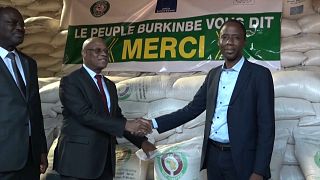ECOWAS
In the aftermath of the ECOWAS summit held in Ghana, Mali's Minister of Foreign Affairs and Cooperation, Abdoulaye Diop, deplored the heavy impact of the sanctions on the population, but also for the entire region, in a context of war in Ukraine which impacts all the economies of the world.
"It is true that we would have expected these sanctions to be lifted immediately.
I think we have to be a little patient. We are in a dynamic that will enable us to achieve this in a few weeks. (...) All the participants are in this dynamic and we must also remember that the few weeks that separate us from this decision must be used to ensure that we Malians remain calm. Let us avoid responding to provocations. Let us really avoid falling into the traps that are set here and there. What seems to me to be important is that the final conclusions of this summit take into account the proposals of the government of Mali and the same proposals take into account the aspirations of the Malians for security reforms, political and institutional reforms in a 24-month transition period that should end in March 2024".
ECOWAS has postponed its decision on the proposed transition period in Mali until 3 July. In the meantime the economic sanctions will continue to bite.
"A large majority of the delegations of heads of state present at the summit also noted the negative impact of these sanctions on the population, and above all the need to be able to lift them quickly in order to strengthen the transition process in Mali, but also to strengthen the regional economic framework, which is currently suffering from this situation, in order to ultimately strengthen peace and stability in our region", said the chief of Malian diplomacy.
The regional bloc is calling for a transition period of 16 to 18 months, as opposed to the 24 months proposed by the Malian authorities.
"We have always said that it was important to reform the electoral system and a draft electoral law has already been submitted to the National Transitional Council. This draft electoral law also includes the issue of a single election management body. So that is an important element. The other element is the writing of a new Constitution and the rest of the parameters is the organisation of the various polls at local, regional and communal level, but also the organisation of legislative elections which must take place towards the end of the transition process followed by the presidential election" added Diop.
Sanctioned by ECOWAS, the Malian authorities seem to benefit from the support of the population, whose resilience was praised by Foreign Affairs and Cooperation minister.
"For us, the most important thing is to bring Malians together. What has been done over the last few months, the difficulties through which we have passed, could not have been achieved if Malians had not joined hands, if they had not looked in the same direction. And I am certain that whatever the challenges, each time Malians decided to unite, we were able to meet those challenges. Especially at a time when the whole of Africa is looking to Mali, we cannot give up. We must remain serene. We know where we want to go. We have defined our vision and we are going to do everything we can to achieve it in peace, in tranquillity, in understanding between Malians. And really, the main objective today is to create the security conditions to be able to organise these elections".











Go to video
Zelenskyy cuts short visit to South Africa after deadly Russian strike on Kyiv
01:14
ECOWAS Meets in Ghana to Tackle Member Withdrawals
Go to video
US plans to reduce diplomatic presence could be part of wider change in US-Africa ties
Go to video
Iran seeks Russia's support for its nuclear talks with US
Go to video
French diplomats given 48-hour notice to leave Algeria
01:13
Niger's junta, Abdourahamane Tchiani sworn in as transitional president for a period of five years